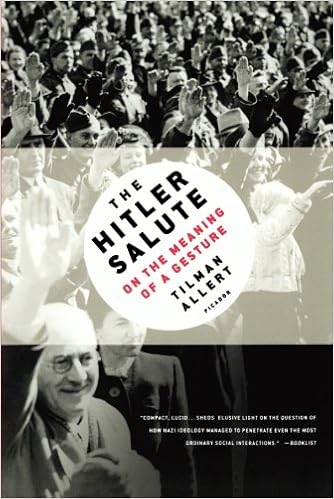The subtitle of this book is On the Meaning of a Gesture, and indeed, that's what this is--a rending, a tearing apart, an analysis of a single gesture--the greeting of Germans during Hitler's Nazi regime. I can't say I was terribly into the discussion of psychology that the author put me through, but what was fascinating was reading about the gesture itself--how it came to be and how Germans were forced to use it. Imagine a political party taking office, creating a way of saying hello (in Hitler's case, it was "Heil Hitler"), and then enforcing it. Worse, imagine that you don't approve of the gesture, but not going along with it could result in losing a job, in losing one's friends, in even losing one's life. This was life for many Germans during the regime.
The book's most interesting section discussed the heil gesture in relationship to religion, the military, and the family. In the latter case, it's a bit hard to know how exactly the gesture was used in informal family life. In the case of the military, officers managed to avoid using it among military men until 1944, when they finally gave in as a show of loyalty after men in the military had attempted to assassinate Hitler. Until then, it was understood that the gesture was simply too much for the military. Among church people, the gesture was mostly given into--though a few resisted, in one case losing his life, in one case fleeing the country. Or try this for size--ways to get out of the gesture. One way, used by a particular professor, was to carry so many books that he couldn't "heil" when entering the classroom.
In the closing section, the book discusses how some embraced it, while others embraced it only in practice (keeping a kind of ironic distance even while doing it to please others). Both, the author says, lead to moral problems. But most Germans did give in, whether superficially, half-heartedly, or wholly. Being the kind of person who doesn't like to create trouble, I suspect that I would fall into one of the first two camps. And in that sense, according to the author, I would still be complicit in the people's sins. Alas, I am glad I do not live in such a society, where I can show off my general cowardliness with such aplomb.
Sunday, November 9, 2008
On "The Hitler Salute" by Tilman Allert ***
Labels:
Books,
Nonfiction,
Three-Star Nonfiction,
Tilman Allert
Subscribe to:
Post Comments (Atom)







No comments:
Post a Comment